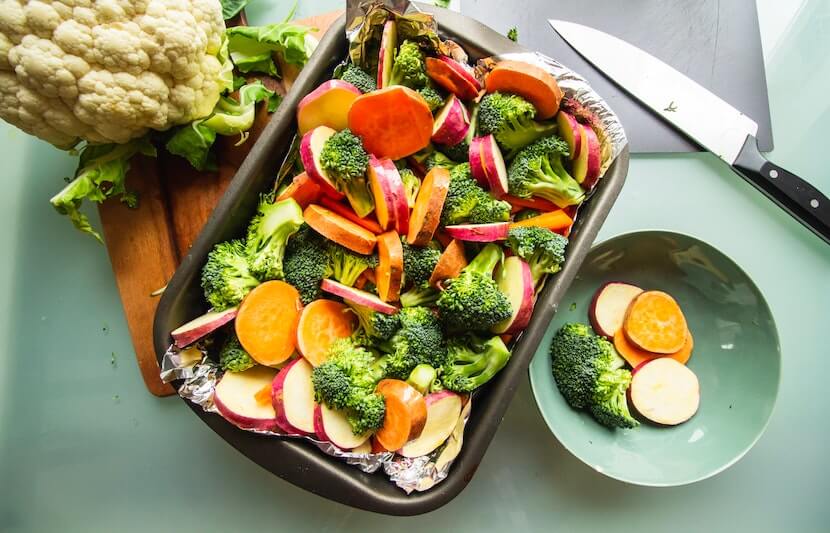Eating high amounts of fruits and vegetables each day may lower the risk of breast cancer and aggressive tumors in women, according to a new study.
Researchers at Harvard T.H. Chan School of Public Health found that yellow and orange vegetables and cruciferous vegetables such as broccoli, in particular, are significantly associated with lower breast cancer risk.
“Although prior studies have suggested an association, they have been limited in power, particularly for specific fruits and vegetables and aggressive subtypes of breast cancer,” Maryam Farvid, a research scientist in the Department of Nutrition and first author of the paper, said in a statement.
“This research provides the most complete picture of the importance of consuming high amounts of fruit and vegetables for breast cancer prevention.”
The study is published online in the International Journal of Cancer.
The study
To conduct the study, the researchers analyzed diet questionnaires submitted every four years by participants in the Nurses’ Health Study and the Nurses’ Health Study II, which are among the largest national investigations into the risk factors for chronic diseases in women.
The first study began in 1980 and consisted of 88,301 women, while the second study began in 1991 and consisted of 93,844 women.
Data was also collected on various potential breast cancer risk factors such as age, weight, smoking status, and family cancer history in biennial questionnaires.
After surveying the diet questionnaires, the researchers found that women who ate more than 5.5 servings of fruits or vegetables a day had an 11 percent lower risk of breast cancer than women who ate 2.5 or fewer servings. A serving is equal to one cup of raw leafy vegetables, half a cup of raw or cooked vegetables, or half a cup of chopped or cooked fruits.
“We know that intake of fruits and vegetables is beneficial for the prevention of several chronic diseases, as well as maintaining a healthy weight,” said Heather Eliassen, an associate professor at Harvard Medical School and Harvard Chan School and associate epidemiologist at Brigham and Women’s Hospital.
“The possibility of a reduction in the risk of breast cancer with higher intake of fruits and vegetables is an additional reason for women to increase their intake of fruits and vegetables.”
How fruits and vegetables affect different tumors
To further develop the study, the researchers conducted an analysis to determine if the benefits of fruit and vegetable consumption differed among various types of breast cancers.
To do this, they analyzed the tumor hormone receptor status and molecular subtype.
The majority of breast tumors express hormone receptors, and many of the long-established risk factors for breast cancer are associated through a hormonal pathway, including reproductive factors, exogenous hormone use and postmenopausal adiposity, Eliassen explained.
However, the researchers found that higher fruit and vegetable consumption was associated with lowering the risk of more aggressive tumors that act through a non-hormonal pathway and are harder to treat, including ER-negative, HER2-enriched and basal-like tumors.
“It is possible we see a stronger association with fruit and vegetable intake for these hormone receptor negative tumors because they are acting through a non-hormonal pathway,” said Eliassen.
“Carotenoids, a group of nutrients found in many colorful fruits and vegetables, are thought to protect against breast cancer through their activity as antioxidants.”
While previous research by the team has linked reduced breast cancer risk with higher fiber intake, this study found that the benefits of fruits and vegetables appear to be independent of fiber content.
This observation suggests that other aspects of these foods, such as antioxidants and other micronutrients, may also play an important role in reducing the risk of breast cancer.
What’s next
The researchers plan on continuing their study on the link between fruits and vegetables and breast cancer.
“We would like to better understand how phytochemicals in these fruits and vegetables may be acting to reduce risk,” said Eliassen.
“Another future step is to understand how fruit and vegetable intake may impact survival after a woman is diagnosed with breast cancer.”
In the meantime, Eliassen encourages women to be conscious of their daily fruit and vegetable intake.
“A good goal to strive for is to have half of your plate at any meal made up of fruits and vegetables, and to aim for variety and color,” she said.



